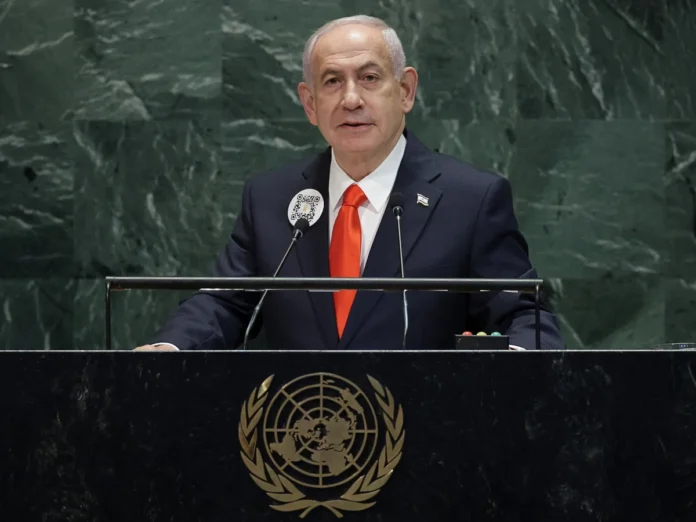Israeli PM Vows to “Finish the Job” Against Hamas
Israeli Prime Minister Benjamin Netanyahu delivered a fiery address at the United Nations General Assembly on Friday, promising to “finish the job” in Gaza despite mounting international criticism. His remarks came as hundreds of delegates from Arab, Muslim, African, and several European nations staged a dramatic walkout in protest of Israel’s military actions.
The walkout underscored the growing global backlash against Israel’s ongoing offensive in Gaza, which has drawn accusations of war crimes and sparked a renewed push for Palestinian statehood.
Chaotic Scenes Inside the UN Assembly Hall

Netanyahu took the stage at 9 a.m. in New York, facing a chamber that quickly descended into chaos. Delegates streamed out in protest while the session’s chairman struggled to restore order amid boos, applause, and shouts from both sides of the debate.
“Western leaders may have buckled under pressure. Israel will not,” Netanyahu declared defiantly. While the United States delegation remained seated, it was represented only by lower-level diplomats, signaling Washington’s discomfort without a full snub.
A Direct Broadcast Into Gaza
In a highly unusual move described by officials as a form of psychological warfare, Netanyahu’s speech was broadcast live into Gaza through loudspeakers set up along the border. Israeli intelligence also reportedly hacked into mobile networks in Gaza to transmit his remarks.
Wearing a pin embedded with a QR code linking to footage from the October 7 Hamas attacks, Netanyahu addressed the remaining hostages still held in Gaza.
Turning to Hamas leaders, he issued a stark warning: “Lay down your arms and release the hostages now. Israel will hunt you down.”
Mounting Diplomatic Pressure on Israel

Netanyahu’s appearance at the UN came during a period of deepening international isolation for Israel. In recent weeks, nearly a dozen countries officially recognized a Palestinian state, marking one of the largest diplomatic shifts in decades.
Even some of Israel’s traditional allies—France, the United Kingdom, Canada, and Australia—announced support for Palestinian statehood, framing it as a step toward reviving the two-state solution.
This wave of recognition coincided with growing legal challenges for Netanyahu. His official plane, Wing of Zion, took an unusually long detour to New York to avoid French and Spanish airspace—both nations being signatories to the International Criminal Court (ICC), which has issued an arrest warrant for Netanyahu on charges of crimes against humanity.
Threat of Sanctions and Legal Proceedings
Israel now faces not only diplomatic pushback but also the threat of economic sanctions. The European Union is reportedly weighing tariffs against Israel, while the International Court of Justice (ICJ) continues deliberations on genocide allegations brought forward by South Africa.
The political fallout has also reached Israel’s closest ally, the United States. In a surprising rebuke, former President Donald Trump—long viewed as one of Netanyahu’s strongest supporters—announced that he would not allow Israel to annex the occupied West Bank, a policy some members of Netanyahu’s right-wing coalition had been pushing in response to the recognition of Palestine.
Divided Global Response
Reactions to Netanyahu’s UN speech highlighted the deep divide within the international community. Supporters applauded Israel’s stance against terrorism, while critics accused Netanyahu of further isolating Israel on the world stage.
For Arab and Muslim countries, the walkout was a clear message that Israel’s military campaign in Gaza is untenable. For Western governments, the issue has shifted from unconditional support for Israel to a balancing act between defending Israeli security and addressing humanitarian concerns in Gaza.
What Comes Next
As the conflict drags on, analysts suggest Netanyahu faces a shrinking diplomatic space to maneuver. His insistence on continuing the war until Hamas is eliminated has bolstered his support at home but risks alienating much of the world.
With hostages still in captivity, civilian casualties rising, and pressure from the ICC and ICJ mounting, Israel finds itself at a crossroads—caught between its military goals and an increasingly hostile global environment.
For Netanyahu, however, the message remains clear: Israel will not back down.

